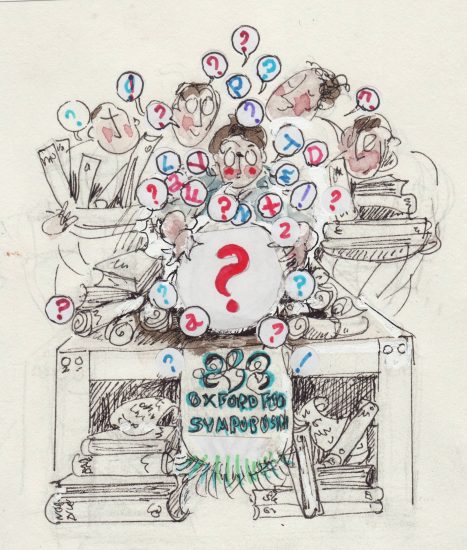
Talking about our Wiki-Editathons with Roberta Wedge
An important element in the Oxford Food Symposium’s on-line presence (we started in earnest in July 2020 – no need to explain why) are the regular Wikipedia training sessions run by Wiki-editor Roberta Wedge:
The monthly Wiki-club meeting at our virtual Kitchen Table builds on previous in-person gatherings (workshops called “editathons”) at the Symposium and the British Library hosted by Trustee Polly Russell. What follows are a few of Roberta’s distilled thoughts on some of the chatline questions that arose after the first OFS live on-line event in 2020, following her recorded video Wiki-editathon: Food & (Mostly) Women(still available on our website).
“In 2019, with our theme being Food & Power, I had addressed the whole symposium under the title Whoever wields the pen, stirs the pot: Wikipedia’s power to shape reality (and why your favourite cuisine, ingredient, culinary heroine or food writer isn’t well represented, and what you can do about it).
“The latest statistics suggest that no more than one in five of the volunteer editors are female – but this is better than it used to be. Likewise, the biographies of women, living and dead, are a fraction of those of the men (as of 2021, about 19%). Wikipedia is created and improved by volunteers. These are overwhelmingly male (and well-educated, from the Global North, with access to computers and leisure time) and so the subjects that are well-represented reflect their interests. The open knowledge movement is well aware of these intrinsic biases, and tries to combat them….
“Food subjects are in general coded as female, as opposed to, say, military matters…and are not as well represented on Wikipedia as they could and should be. The food and drink section is shockingly small….Of “Featured Articles” – i.e. those that have been peer-reviewed to gold-star-excellent level – the FAs about food and drink total only 44 (up from 21 in 2019), with only seven deemed highly important (Jane Grigson among them), eleven of mid-level importance, and 26 of low importance, including a dozen articles about species of mushroom. As of 27.10.22, there are 6,160 Featured Articles out of 6,567,050 articles on the English Wikipedia. Of course, there are hundreds and thousands of other food articles, but not to the high quality they deserve.
“If this inspires you to want to write a Featured Article – great! Likewise, if you want to run a marathon or an award-winning restaurant, fantastic! I’d advise you to start with a realistic goal, work towards and achieve that, and then set your sights higher….You can create and write a perfectly decent Wikipedia article by yourself, but no one can get it to FA without collaboration and teamwork. It takes a while to build up those skills.
“If you’re a beginner, begin. If you’ve already begun, move on to writing better articles. I would endorse adding links as a good way to get started and also improve the resources. I can only confirm and encourage everyone to start with translating. The different views in different languages will be done by other editors. It’s actually a great research tool to check and compare the differences amongst several language entries on one item.
“Wiki can only ever be a starting point for serious research, but the same is true of any encyclopedia. [Bear in mind that to get an entry accepted] it’s all in the framing. For instance, although Mary Wollstonecraft is Featured Article and she wasn’t a foodie, her first suffragette-era biographer was. Allow me to introduce Elizabeth Robins Pennell, cookbook collector and cycling travel writer, who brought her talent and expertise in art criticism to the culinary table. Pennell is not yet FA, but she’s still pretty solid….Of the 21 food-related Featured Articles, I’ll choose Maple syrup: my Montreal childhood was punctuated by sugaring-off season when the sap was running just right.
“I’m glad if the current situation shocks you; now I invite you to get involved and improve matters.”
